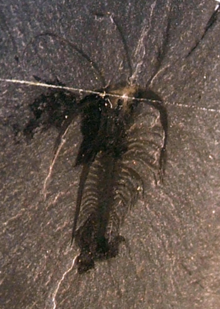- Dark stain
-
A dark stain is often associated with fossils of the Burgess Shale, representing decay fluids that were squashed out of the organism during the taphonomic process.
Occurrence
It is most famously known in (and most commonly associated with) Marrella,[1] and is also known in other organisms: for example, Aysheaia, where it protrudes from the anterior (and in one case posterior) end of the animal;[2] Hallucigenia,[3] Naraoia,[4] and Alalcomeneaus.[5] It is also present in other Lagerstätten, for example in Carboniferous crustacea from Ireland.[6]
Formation
The formation of this stain is the subject of ongoing research. It was originally speculated that it represented body contents forced out by the pressure of overlying rocks,[2] although decay contents would form more quickly and thus be a more likely interpretation.[3] This is supported by their presence around organisms whose external wall apparently ruptured; dark stains are also found in Carboniferous fish, and oily liquids have been seen to ooze out of the mouth and anus of decaying seals.[3] A high abundance of elemental copper has been taken to suggest that it represents "blood" (i.e. the haemocoel of arthropods and molluscs).[7] Although copper was not analyzed in the canonical work on Elemental Mapping of Burgess Shale organisms, the dark stain was higher in Si and lower in Al and K than elsewhere.[8]
References
- ^ Whittington, H. B. (1971). "The Burgess Shale: history of research and preservation of fossils". North Am. Paleont. Convention, Chicago, 1969, Proc. I, Allen, Lawrence, Kansas: 1170–1201.
- ^ a b Whittington, H. B. (1978). "The Lobopod Animal Aysheaia pedunculata Walcott, Middle Cambrian, Burgess Shale, British Columbia". Phil. Trans. R. Soc. Lond. B 284 (1000): 165–197. Bibcode 1978RSPTB.284..165W. doi:10.1098/rstb.1978.0061.
- ^ a b c Conway Morris, S. (1977). "A new metazoan from the Cambrian Burgess Shale, British Columbia.". Palaeontology 20: 623–640. http://palaeontology.palass-pubs.org/pdf/Vol%2020/Pages%20623-640.pdf.
- ^ Whittington, H. B. (1977). "The Middle Cambrian Trilobite Naraoia, Burgess Shale, British Columbia". Philosophical Transactions of the Royal Society B: Biological Sciences 280: 409. Bibcode 1977RSPTB.280..409W. doi:10.1098/rstb.1977.0117.
- ^ Briggs, D. E. G.; Collins, D. (1999). "The Arthropod Alalcomenaeus cambricus Simonetta, from the Middle Cambrian Burgess Shale of British Columbia". Palaeontology 42: 953. doi:10.1111/1475-4983.00104.
- ^ Orr, P. J.; Briggs, D. E. G.; Kearns, S. L. (2008). "Taphonomy of Exceptionally Preserved Crustaceans from the Upper Carboniferous of Southeastern Ireland". PALAIOS 23: 298. doi:10.2110/palo.2007.p07-015r.
- ^ PRATT, Brian R.; PUSHIE, M. Jake,; PICKERING, Ingird J.; GEORGE, Graham N.. "SYNCHROTRON IMAGING OF BURGESS SHALE FOSSILS: EVIDENCE FOR BIOCHEMICAL COPPER (HEMOCYANIN) IN THE MIDDLE CAMBRIAN ARTHROPOD MARRELLA SPLENDENS". http://gsa.confex.com/gsa/2010RM/finalprogram/abstract_171740.htm.
- ^ Orr, P. J.; Briggs, D. E. G.; Kearns, S. L. (1998). "Cambrian Burgess Shale Animals Replicated in Clay Minerals". Science 281 (5380): 1173–1175. Bibcode 1998Sci...281.1173O. doi:10.1126/science.281.5380.1173. PMID 9712577.
Categories:
Wikimedia Foundation. 2010.

